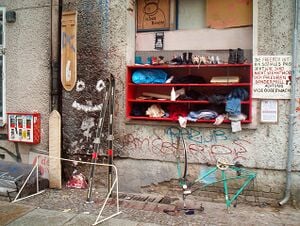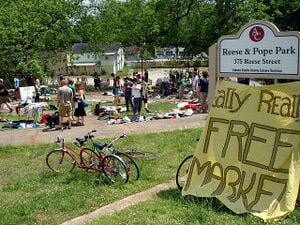
 “If we design well, we design for shared aliveness”. Speaking from China, John Thackara lays out an economy defined by care, The Daily Alternative (Jul 28, 2023)
“If we design well, we design for shared aliveness”. Speaking from China, John Thackara lays out an economy defined by care, The Daily Alternative (Jul 28, 2023)
In towns and Cities free stuff can widen access to Arts and culture, Health and sports events and so aid Social inclusion, lifting general levels of wellbeing. In local communities free stuff can help develop the idea of stewardship of community resources. Giving away unwanted items to enable reuse can sometimes be a preferred or greener option than landfill or recycling.
Events[edit | edit source]
 Apr 28, 2023 (Fri) — Pay it Forward Day, payitforwardday.com
Apr 28, 2023 (Fri) — Pay it Forward Day, payitforwardday.com Sep 15, 2024 (Sun) — Free Money Day, Global invitation for people to explore, in a liberating and fun way, what it might be like if our relationship to money was a little different. Sep 15, annually, freemoneyday.org
Sep 15, 2024 (Sun) — Free Money Day, Global invitation for people to explore, in a liberating and fun way, what it might be like if our relationship to money was a little different. Sep 15, annually, freemoneyday.org
see also: Burning Man, Nuit Blanche
Community action projects[edit | edit source]
- encourage the idea of pay it forward and random acts of kindness
- Give or take days, stalls or shops
- Post-Christmas ‘Re-gifting’ Give & Take eg: Transition Dartmouth Park
- encourage freecycling
- learn about and practice asset-based community development
- promote the gift economy
- set up giving circles
- support and create free content and encourage the use of copyleft - type licenses
- hold a potlatch, see United States#Free stuff
Resources[edit | edit source]
How to[edit | edit source]
- How to set up a swap or free store, Shareable, Dec 10, 2018
- How to start and participate in a Buy Nothing group, Oct 26, 2018, Shareable
- How to Integrate Gift Circles into Any Community, 2014, from Shareable
- How to Make a Free Things Box, Shareable, May 13, 2013
- How to Start a Really Really Free Market, 2010, from Shareable
- Recipes for austerity, Transition Network, 'recipe' for how to hold your own 'give & take'
Video[edit | edit source]
Other resources[edit | edit source]
- Philosophy of the GNU Project, Free Software Foundation
News and comment[edit | edit source]
2018
'I leave the car at home': how free buses are revolutionising one French city, Oct 15[1]
Paris Gets Serious About Free Transit, May 16[2]
2015
Giftival Celebrates the Heart of the Global Gift Economy, August 18[3]
2014
The Birth of a Freestore, July 10[4]
2013
How to Date Without Money, May 29[5]
Other costs[edit | edit source]
Free stuff may be in some senses free, yet still have environmental costs. Questions to ask when accepting or acquiring free stuff:
- do you really need it?
- would it be supporting unsustainable production?
- are there costs associated with it's reuse, repair, recycling or disposal?
Gift economy[edit | edit source]
A gift economy, gift culture or gift exchange is a mode of exchange where valuables are not sold, but rather given without an explicit agreement for immediate or future rewards. W
Freecycling[edit | edit source]
Freecycling or free recycling, is the act of giving away usable unwanted items to others instead of disposing of them in landfills. This term is most often associated with online groups who run mailing lists which offer items to members at no cost. W
Free shops and Give or take days, stalls or shops[edit | edit source]
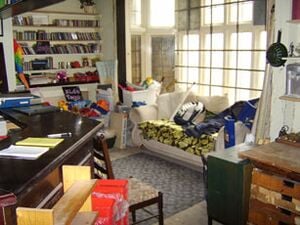
"Give-away shops", "freeshops" or "free stores" are stores where all goods are free. They are similar to charity shops, with mostly second-hand items—only everything is available at no cost. Whether it is a book, a piece of furniture, a garment or a household item, it is all freely given away, although some operate a one-in, one-out–type policy (swap shops). Today the idea is kept alive by the new generations of social centres, anarchists and environmentalists who view the idea as an intriguing way to raise awareness about consumer culture and to promote the reuse of commodities. W
The new intellectual commons: Free content[edit | edit source]
Free content, or free information, is any kind of functional work, artwork, or other creative content that meets the definition of a free cultural work. A free cultural work is one which has no significant legal restriction on people's freedom:
- to use the content and benefit from using it,
- to study the content and apply what is learned,
- to make and distribute copies of the content,
- to change and improve the content and distribute these derivative works W
Copyleft vs copyright: the gift of 'free' speech[edit | edit source]
Engineers, scientists and software developers have created open-source software projects such as the Linux kernel and the GNU operating system. They are prototypical examples for the gift economy's prominence in the technology sector and its active role in instating the use of permissive free software and copyleft licenses, which allow free reuse of software and knowledge. Other examples include: file-sharing, the commons, open access.
Giving circles[edit | edit source]
Giving circles are a form of participatory philanthropy where groups of individuals donate their own money or time to a pooled fund, decide together where to give these away to charity or community projects and, in doing so, seek to increase their awareness of and engagement in the issues covered by the charity or community project. Many circles, in addition to donating their money, also contribute their time and skills to support local causes. W
Pay it forward[edit | edit source]
Pay it forward is an expression for describing the beneficiary of a good deed repaying it to others instead of to the original benefactor. In Ryan Hyde's book and movie (of the same name) it is described as an obligation to do three good deeds for others in response to a good deed that one receives. Such good deeds should accomplish things that the other person cannot accomplish on their own. In this way, the practice of helping one another can spread geometrically through society, at a ratio of three to one, creating a social movement with an impact of making the world a better place. W
Post growth[edit | edit source]
Post growth can be considered an asset-based approach to community development, applied not only to community development but across a wide range of categories and in response to limits-to-growth challenges, as it seeks to build on the cultural and technological assets that already exist and are facilitating the emergence of post growth futures. W
Really Really Free Market[edit | edit source]
The Really, Really Free Market (RRFM) movement is a horizontally organized collective of individuals who form a temporary market based on an alternative gift economy. The RRFM movement aims to counteract capitalism in a proactive way. It holds as a major goal to build a community based on sharing resources, caring for one another and improving the collective lives of all. Markets often vary in character, but they generally offer both goods and services. Participants bring unneeded items and food, as well as skills and talents such as entertainment or haircuts. A RRFM usually takes place in an open community space such as a public park or community commons. W
Burning Man[edit | edit source]
Burning Man is a week-long annual art and community event held in the Black Rock Desert in northern Nevada, in the United States. The event is described as an experiment in community, radical self-expression, and radical self-reliance. The event forbids commerce (except for ice, coffee, and tickets to the event itself) and encourages gifting. Gifting is one of the 10 guiding principles, as participants to Burning Man (both the desert festival and the year-round global community) are encouraged to rely on a gift economy. The practice of gifting at Burning Man is also documented by the 2002 documentary film Gifting It: A Burning Embrace of Gift Economy, as well as by Making Contact's radio show "How We Survive: The Currency of Giving [encore]".
Main article: Burning Man
Nuit Blanche[edit | edit source]
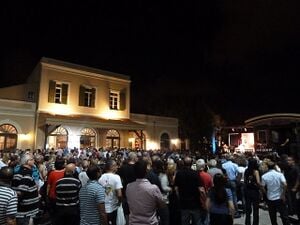
Nuit Blanche (French pronunciation: [nɥi ˈblɑ̃ʃ]) (White Night) is an annual all-night or night-time arts festival of a city. A Nuit Blanche typically has museums, private and public art galleries, and other cultural institutions open and free of charge, with the centre of the city itself being turned into a de facto art gallery, providing space for art installations, performances (music, film, dance, performance art), themed social gatherings, and other activities.
See also[edit | edit source]
- Ethical consumerism
- Food, sustainable community action
- Localism
- Reduce, reuse, repair and recycle
- Sharing
- Towards sustainable economies
local information and news can be found, or shared, via our many location pages
External links[edit | edit source]
Wikipedia: Gift economy, Freecycling, Give-away shop, Giving circles, Nuit Blanche, Pay it forward, Post growth, Potlatch, Random act of kindness, Really Really Free Market
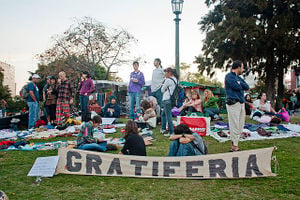
- Buy Nothing Project
- Recycling Your Unwanted Items For Free With Freegive - Free Give is made up of groups with members across the world. Free Give connects people who are giving and getting stuff for free in their own towns. It's all about reuse and keeping good stuff out of landfills. There is no charge for this, it's completely free to join.
- Social Storehouse
